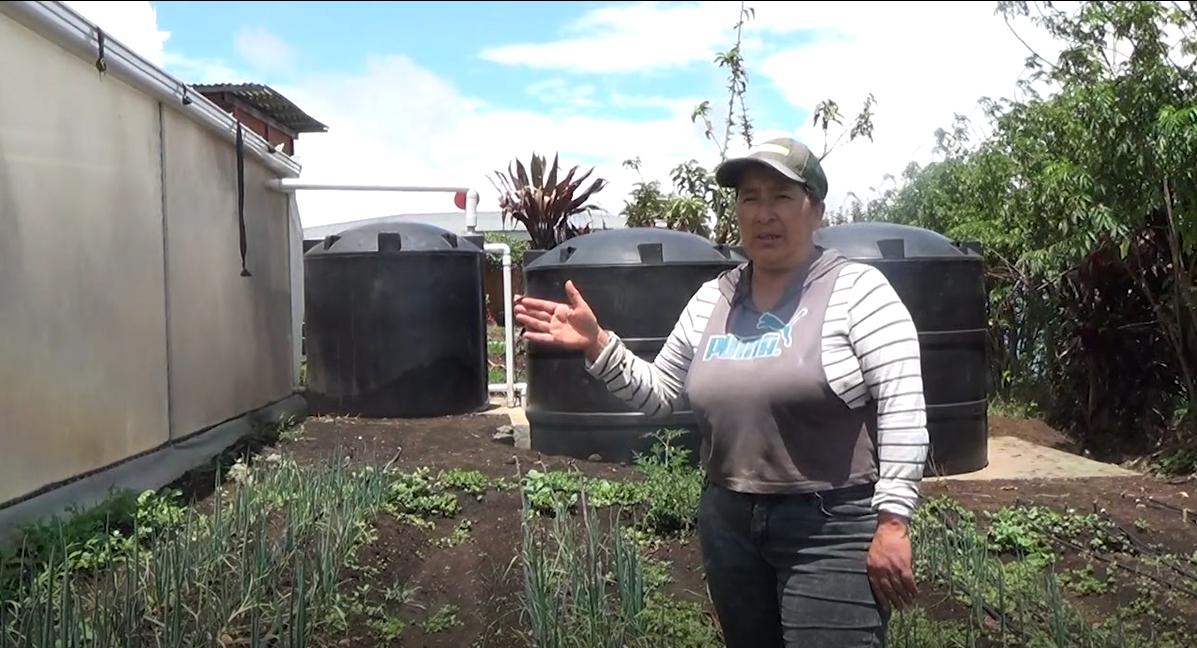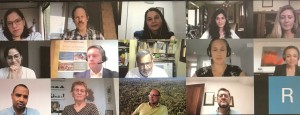Ms. Sonia Gómez, a farmer supported by the project speaking in front of rainwater capture and storage tanks connected to efficient drip irrigation lines to water crops. (Photo by Fundecooperación)
Adaptation Fund’s First Virtual Project Visit a Success
Virtual Activities Broadened During Pandemic
Washington, D.C. (September 21, 2020) — When rural farmers and project implementers joined a recent visit in early August from the Adaptation Fund to a project it funds in Costa Rica, there was a twist.
Unlike all of the Fund’s previous 15 portfolio monitoring missions (PMMs) around the globe that were conducted in person, they joined the visit virtually from Internet hotspots across the country.
This virtual format PMM was the first of its kind organized by the Fund in the context of restrictions due to the COVID19 pandemic.
This had a benefit of enabling Fundecooperación para el Desarrollo Sostenible, the Fund’s national implementing entity (NIE) that carries out the project in Costa Rica, to reach more local partners and beneficiaries across a diverse range of climate-vulnerable areas that are several hundred miles apart. It would have been impossible to reach all of them in a typical PMM, but the virtual visit included participation from 10 different areas of the project spread across the north, south, east, west and central parts of the country.
The three-day event was simultaneously webcast in Spanish and English, and featured speakers from the Costa Rican Ministries of Environment and Agriculture, including then-Minister of Environment and Energy Carlos Manuel Rodríguez (who this month started as CEO and Chairperson of the Global Environment Facility), then-Director of Climate Change Andrea Meza Murillo (who was later appointed as the new Environmental Minister), Fundecooperación, the Adaptation Fund Board and Secretariat, beneficiaries and project coordinators. It included videos and presentations sharing results and knowledge gleaned from the project.
“We were very honored that the Adaptation Fund decided to innovate this virtual project visit with us,” said Marianella Feoli, Executive Director of Fundecooperación. “The Adaptation Fund has been a long-time ally not only for Fundecooperación, but for the country. Starting with our accreditation in 2012, we have always received a lot of support from the Fund. To be able to show the results in the field is great. The Fund is making a big difference. Project success is due to partnerships and relationships we have cultivated.”
Direct Access – a climate finance modality pioneered by the Fund that empowers countries to access funds and develop projects directly through accredited NIEs – has been pivotal in providing Fundecooperación flexibility to adapt and foster country ownership in implementing the project, while promoting partnerships across government and civil society. The project features 40 localized projects that have involved the participation of more than 80 local, national and regional organizations, further showcasing ‘Enhanced Direct Access’.
The US$ 10 million project is focused on reducing climate vulnerability in multiple critical sectors of agriculture and livestock, water resources and coastlines. It has exceeded goals in several areas and is a candidate to be scaled up. Most importantly, it is working directly for people in communities and improving their resilience and lives.
More than 400 farmers have been supported to implement climate-smart measures, while the project sustainably manages coral reefs and other ecosystems that reduce climate impacts and diversifies livelihoods. It has planted 1,300 coral colonies and restored 62 acres of mangrove forest. Other results include 24 km of coastlines and beaches that have been redesigned and reforested, and more than 100 ha of recharged aquifers. It has further installed eight hydrometeorological stations and created early warning systems for forest fires that are being implemented in nine conservation areas.
It has been especially adaptive in the time of COVID-19. It promotes food security by empowering vulnerable farmers to diversify production and then connecting them with local buyers to foster self-sufficiency and resilience. By improving 100 local aqueducts, communities have also enhanced water access — which is pivotal during a pandemic.
The project additionally empowers indigenous communities to restore traditional, sustainable farming practices, while conserving land and resources – for which it received the international Innovagro Award for Social Innovation last year.
Sonia Gómez, a multi-generational family farmer in Tierra Blanca, runs a model organic vegetable farm supported by the project which has helped establish a greenhouse and water harvesting system. She is sharing the knowledge with others to multiply its impacts. “It helped me a lot,” she said. “We produce healthy and organic products.”
The project also has a focus on youth and women. Over 4,400 beneficiaries have received marine knowledge through restoration of coral reefs, ecological monitoring, building coral resilience, underwater gardening and educational submarine and snorkeling trails. “The sensation is so incredible and emotional that one feels, as we begin to know the different varieties of coral and the life there is between the corals,” said Yajaira Concepción, a young beneficiary. “Thanks to these ecosystems that the corals are generating, it is extremely exciting. Each day I feel more committed to protect them, and each day I feel the community learns step by step the importance of this and that the coral reefs we have here in Costa Rica and around the world.”
The country’s national adaptation policies, planning and implementation processes have been fostered through the project. While illustrating the importance of adaptation, it has brought the agricultural and environmental sectors together and generated innovation and trust. Protection of natural areas are benefiting heath, nature and economics, while making farms climate-resilient.
“This is the first virtual project monitoring mission. The goal is to learn and share. It had outstanding engagement and exceeded expectations,” said Mikko Ollikainen, Adaptation Fund Manager. “This project has delivered excellent, concrete results on the ground. Some of these results have been significantly higher than planned. We are very proud of this programme.”
The project visit was not the first Adaptation Fund event to go virtual. Other staple events of the Fund have been going virtual for the first time, as well, receiving excellent participation.
Among them, the Fund hosted its 7th annual global seminar for NIEs virtually in early September, with nearly all 32 of its NIEs from around the world attending among some 60 participants over three days. It is further hosting its second country exchange for NIEs, this time virtually with CSE-Senegal which will include a virtual tour of project sites using drone footage. It also hosted a webinar in late August on its emerging Innovation pillar, which included an engaging discussion over Facebook Live and 180 total viewers.
Since the beginning of the crisis, the Adaptation Fund Board has also responded to countries’ needs through virtual reviews of new project proposals and other key items.
“It is great to see the Adaptation Fund adapting and being creative in broadening our virtual activities and continuing to deliver to the most vulnerable, while supporting our partners in timely ways during these challenging times,” said Adaptation Fund Board Chair Ibila Djibril.
_______________________________________________________________________
ABOUT the ADAPTATION FUND
Communications: Matthew Pueschel, mpueschel@adaptation-fund.org or +1-202-473-6743
Attachments
| Attachment | Type | Size |
|---|---|---|
| Press Release September 21, 2020 | 153 KB |




